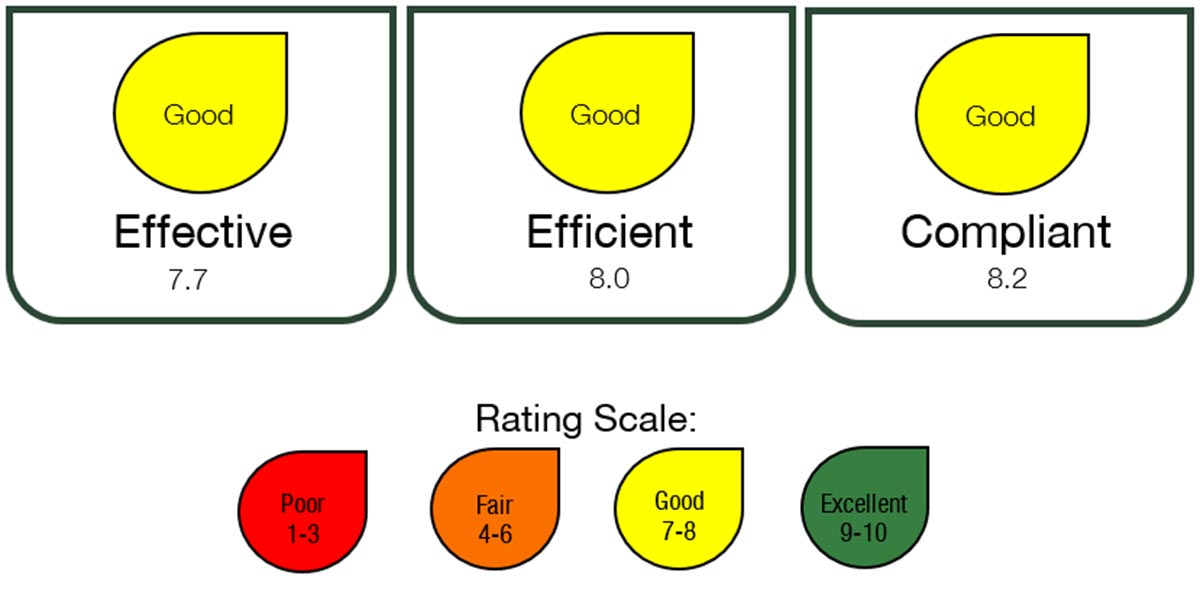Continuous improvement program - 2020-2021 Annual report
Annual evaluation
Twenty-four randomly selected impact assessments are evaluated each year to see how well they meet the Effective, Efficient and Compliant expected results of the Parks Canada Directive on Impact Assessment.

-
Figure descriptionLong text description
Representation of the results of the 2020-2021 Annual Evaluation, according to a rating scale where poor scores are from 1 to 3, fair scores are from 4 to 6, good scores 7 to 8 and excellent are from 9 to 10. The results are good (7.7) in the Effective category, good (8.0) in the Efficient category and good (8.2) in the Compliant category.
Highlights
- Appropriate impact assessment pathway was chosen.
- Basic Impact Assessments (BIA) were written efficiently.
- High policy and legislative compliance with some gaps.
- Quality of writing in BIAs requires improvement.
Key recommendations
- Develop and deliver training on how to write Impact Assessment reports.
- Revise the BIA and Impact Assessment Pathway Decision templates to address gaps.
Key investigation
The topic of the 2020-21 key investigation was Indigenous consultation and engagement which contributes to the Effective and Compliant Expected Results. The focus was on gathering information, learning and sharing best practices. The Key Investigation included a 33 question survey of Parks Canada’s Impact Assessment Practitioners and Indigenous Affairs Officers including one-in-one interviews and follow-up on select responses for more detail.
Highlights
- A wide variety of Parks Canada staff are involved in consultation and engagement for impact assessment with the top three groups being: Indigenous Liaison Advisors, Impact Assessment Practitioners and Resource Conservation Managers.
- There is a need for clarification of roles within the project team and how consultation and engagement for impact assessment fits within consultation and engagement for the project.
- The following themes were highlighted when asked to share best practices for consultation and engagement in impact assessment: relationship building and early engagement prior to consultation, the importance of openness and transparency which can be facilitated by regular meetings, flexibility required depending on the group and stage of relationship, and two-eyed seeing as a key element for meaningful engagement.
- The majority of respondents indicated that their relationship with Indigenous partners and their site were in the initiating (defined as the initial stage of relationship building) or growing (defined as having established relationships and developing processes for working together) relationship phase.
- Parks Canada sites are developing a variety of protocols and procedures to facilitate consultation and engagement for impact assessment. Examples include:
- Collaborative Archaeology Protocol co-developed with Indigenous partners
- Standard Operating Procedures for preparation of consultation letters co-developed with Indigenous partners
- Tracking tools to record and archive consultation activities and communications
- Consultation checklist to flag projects for consultation and engagement
- Consultation protocol for impact assessment co-developed with Indigenous partners
- There is a need for training on how to incorporate Indigenous Knowledge into impact assessments.
Key recommendations
- Share results of the key investigation and information on the impact assessment program with Parks Canada Indigenous Liaison Advisors to enhance understanding of how impact assessment and consultation and engagement fit within the management of a project.
- Revise impact assessment forms to clarify the type of information required on consultation and engagement to demonstrate compliance with the Impact Assessment Act.
- Conduct a session on incorporating Indigenous Knowledge into impact assessment for Parks Canada Impact Assessment Practitioners.
- Incorporate applicable results of the Key Investigation into Parks Canada training under development on how to write impact assessments.
- Date modified :